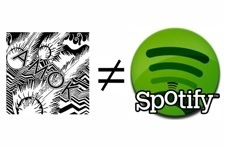In a series of Tweets on Sunday, famed producer Nigel Godrich called Spotify “bad for new music” and said three of his projects had been pulled from the ad-supported subscription service.
Godrich takes issue with the economics of Spotify and the royalties that flow to artists. “The numbers don’t even add up for spotify yet,” he tweeted. “But it’s not about that.. It’s about establishing the model which will be extremely valuable. Meanwhile small labels and new artists can’t even keep their lights on. It’s just not right.”
Godrich named three albums that have been pulled from Spotify: “Eraser,” the 2006 solo album Radiohead singer Thom Yorke; the 2013 album “Amok” by Atoms for Peace (of which Yorke and Godrich are members); and the self-titled album by Ultraista, a collaboration between Godrich, Joey Waronker (also a member of Atoms for Peace) and Laura Bettinson.
Although Godrich called the removal of the three albums a “small, meaningless rebellion,” he is a powerful voice in the music business. He has produced every Radiohead album since 1997’s “OK Computer” as well as material by Beck, The Strokes, Pavement, Travis, Air and Gnarls Barkley.
The outburst shows a schism between much of the music industry’s belief in Spotify’s business model and critics who feel labels and artists do not receive enough money for streams of their music. “Millions of streams get [small labels and new artists] a few thousand dollars,” he wrote. “Not like radio at all.”
Godrich’s comments are similar to those made by Yorke in an interview with the Guardian in February. Speaking of Radiohead’s decision to employ a “pay what you want” pricing model for its 2007 album “In Rainbows,” Yorke said he now believes the band ended up enriching technology companies. “They have to keep commodifying things to keep the share price up, but in doing so they have made all content, including music and newspapers, worthless, in order to make their billions. And this is what we want?”
Some people see subscription services as promotion that encourages purchases. But Godrich believes new releases need more support from subscription services. A catalog that has already recouped its investment makes more sense at Spotify, he writes. Using the example of Pink Floyd, whose catalog was added to Spotify just last month, Godrich says it “makes total sense” to add the catalog to a streaming site. However, he believes “Dark Side of the Moon” would have been too expensive to make if people had been listening to Spotify instead of buying records in 1973.
Much of the new music business has embraced sponsorships, synchronizations and streaming as tools in the standard tool kit. But Godrich’s statements show how much a segment of the industry still depend on customer purchases. Without mentioning it by name, Godrich reveals the thought process behind “windowing,” the practice of staggering release dates to encourage purchases before fans can stream at services like Spotify.
Windowing is a controversial practice that has been embraced by relatively few artists and labels and bemoaned by the services it affects. Adele and Taylor Swift are among the biggest names to keep a new release off one or more subscription services in the hopes people will purchase rather than stream music. It is common to see a handful of independent label releases held back from subscription services for one or two weeks.


